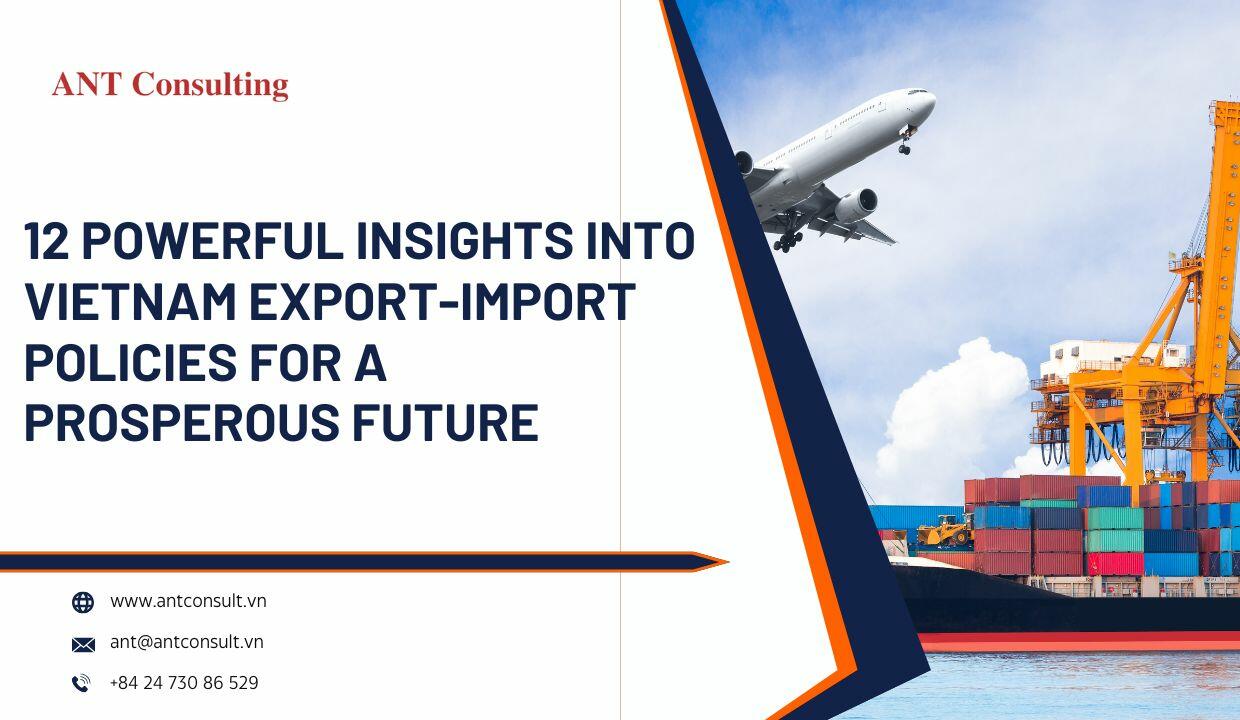Vietnam has solidified its position as a rising star in global trade, driven by forward-thinking strategies and adaptive export-import policies. With its growing influence, Vietnam’s trade policies are carefully designed to foster sustainable economic growth, expand international market presence, and embrace innovation.
In here, we explore Vietnam export-import policies, uncovering how they shape the country’s trade landscape and ensure long-term prosperity.

Strategic Vision for Vietnam Export-Import Policies
Vietnam’s export-import strategy is rooted in its long-term economic growth objectives and international trade commitments. The Vietnam government has issued the decision to outlines a clear roadmap to balance trade, enhance competitiveness, and integrate sustainable practices into trade policies.
Key highlights include:
- Promoting value-added exports over raw materials.
- Expanding export markets beyond traditional trading partners.
- Encouraging sustainable production practices for a greener trade future.
By embracing these Vietnam export-import policies, the country aims to maintain balanced
Export Growth through Innovation
Vietnam’s commitment to exporting high-value products is at the core of its export-import policies. The government encourages industries to adopt technology-driven production methods and shift toward value-added manufacturing.
Examples of initiatives:
- Incentives for high-tech sectors like electronics and renewable energy.
- Supporting startups in innovative export-oriented ventures.
- Partnering with global tech firms to boost export quality.
With these policies in place, Vietnam is not only achieving impressive export growth but also positioning itself as a hub for high-tech production.
Investment Incentives Supporting Exports
Investment incentives are a cornerstone of Vietnam export-import policies. The government offers a host of benefits to attract both domestic and foreign investors:
- Tax reductions for export-focused businesses.
- Simplified administrative processes for investment approvals.
- Development of export-focused economic zones.
These incentives have transformed Vietnam into a preferred destination for foreign direct investment (FDI), driving growth in export industries.
Diversification of Export Markets
Diversification is a key priority within Vietnam export-import policies, aimed at reducing dependency on specific markets. While China, the United States, and the EU remain dominant trade partners, Vietnam is proactively exploring opportunities in:
- Africa and South America.
- Eastern Europe and Central Asia.
- Emerging markets in the Middle East.
Expanding its market presence strengthens Vietnam’s trade resilience and aligns with its strategic goals for a balanced trade ecosystem.
Import Policies for Economic Stability
Vietnam’s import policies are carefully crafted to ensure economic stability while meeting domestic demand. The government imposes tariffs, quotas, and licensing requirements for specific imports, focusing on:
- Protecting local industries from excessive competition.
- Ensuring safety and quality of imported goods.
- Encouraging imports that support technological advancement.
By managing imports strategically, Vietnam mitigates trade imbalances and strengthens its domestic industrial base.
Integration with Global Trade Agreements
Vietnam has emerged as a key player in global trade agreements, leveraging these partnerships to enhance its export-import policies. Notable agreements include:
- The Comprehensive and Progressive Agreement for Trans-Pacific Partnership (CPTPP).
- The EU-Vietnam Free Trade Agreement (EVFTA).
- The Regional Comprehensive Economic Partnership (RCEP).
These agreements offer preferential access to global markets, encourage tariff reductions, and align Vietnam’s trade practices with international standards.
Promoting Green Trade
Sustainability is a growing focus in Vietnam export-import policies. The government is encouraging businesses to adopt environmentally friendly practices, including:
- Transitioning to renewable energy production.
- Promoting exports of green products like organic agricultural goods.
- Implementing stricter environmental standards for imported goods.
By prioritizing green trade, Vietnam not only enhances its global competitiveness but also fulfills its commitment to sustainable development.
Digital Transformation in Trade Management
Digital transformation is revolutionizing trade in Vietnam, making it an integral part of the country’s export-import policies. Key initiatives include:
- Developing an electronic customs system for faster clearance.
- Leveraging blockchain technology to enhance supply chain transparency.
- Promoting e-commerce exports, particularly for SMEs.
These digital tools ensure efficiency, reduce costs, and strengthen Vietnam’s position in the digital economy.
Challenges Facing Vietnam Export-Import Policies
Despite its achievements, Vietnam faces several challenges in implementing its export-import policies:
- Over-dependence on a few key markets like the US and China.
- Supply chain disruptions caused by global economic uncertainties.
- Environmental pressures to adopt greener production methods.
Addressing these challenges will require collaborative efforts from both policymakers and the private sector.
Enhancing Trade Infrastructure
Robust infrastructure is essential for effective Vietnam export-import policies. The government has invested significantly in:
- Expanding ports and logistics networks.
- Upgrading transportation systems for seamless trade flow.
- Establishing free trade zones to support export activities.
These investments are pivotal in maintaining Vietnam’s competitive edge in global trade.
Supporting SMEs in Export-Import Activities
Small and medium enterprises (SMEs) form the backbone of Vietnam’s economy, and their inclusion in trade policies is crucial. Vietnam export-import policies provide:
- Access to export financing and trade credit guarantees.
- Training programs to enhance SME competitiveness.
- Platforms to connect SMEs with international buyers.
By empowering SMEs, Vietnam ensures equitable growth and a more diverse trade ecosystem.
Future Outlook for Vietnam Export-Import Policies
The future of Vietnam export-import policies is centered on:
- Strengthening trade partnerships with untapped markets.
- Accelerating the adoption of Industry 4.0 technologies in trade.
- Expanding green trade practices for sustainable growth.
As Vietnam continues to refine its policies, it is well-positioned to achieve its vision of becoming a global trade leader.
Conclusion
Vietnam’s trade policies are a testament to its commitment to sustainable growth and global economic integration. By focusing on innovation, diversification, and sustainability, Vietnam export-import policies are paving the way for a prosperous future. For businesses and investors, understanding these policies is essential to capitalize on the opportunities presented by one of the world’s fastest-growing economies.
About ANT Consulting and Market Entry Services in Vietnam
ANT Consulting is here to assist you from the outset; providing intelligence, information, advisory, management or support services that assist market entrance, and ensure efficient business start-up operation.
Research Service
Company Profiling and Due Diligence
Policy and Regulatory Research
Assistance in Setting-up Business Venture
M&A Origination & Execution
For legal advise, consult with ANT Lawyers
How ANT Consulting Could Help Your Business?
You could learn more about ANT Consulting or contact our lawyers and business consultants in Vietnam for advice via email ant@antconsult.vn or call our office at +84 28 730 86 529




